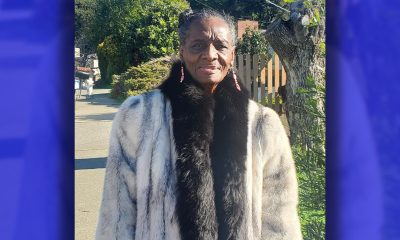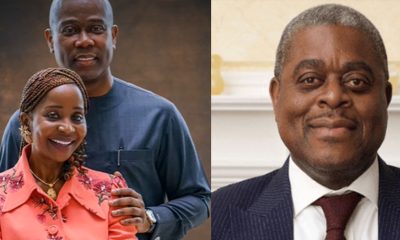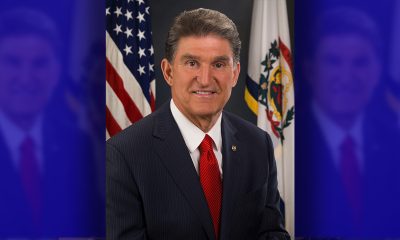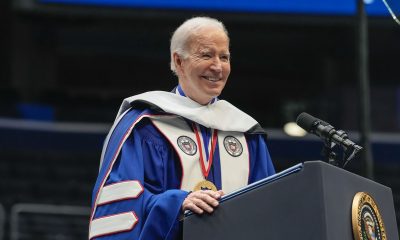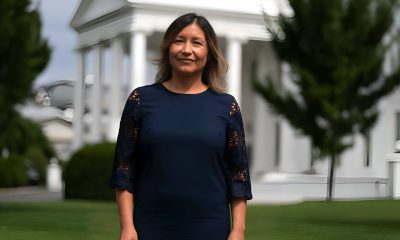Politics
Obama and Kenya: 1st Trip to Father’s Homeland as President

In this Thursday, Feb. 5, 2008 file photo, a photograph of Barack Obama Sr., father of President Barack Obama, hangs on the wall of his step-grandmother Sarah Obama’s house in the village of Kogelo, near the shores of Lake Victoria, in Kenya. On Friday, July 24, 2015 Obama is due to arrive in Kenya, the country of his father’s birth, for the first time since he was a U.S. senator in 2006, and the first stop on his two-nation African tour in which he will also visit Ethiopia. (AP Photo/Ben Curtis, File)
JULIE PACE, AP White House Correspondent
WASHINGTON (AP) — When Barack Obama visited Kenya for the first time nearly 30 years ago, he was astonished that an airport worker recognized his last name.
It was a striking experience for a young man — and future American president — struggling to understand how a country he had never seen and a Kenyan family he barely knew had shaped his identity.
“My name belonged and so I belonged, drawn into a web of relationships, alliances, and grudges I did not yet understand,” Obama wrote in his memoir, “Dreams From My Father,” about the airport encounter.
This week, Obama will make his first visit to Kenya as U.S. president, a trip that will bear little resemblance to the 1988 one, when he arrived aboard commercial flight and his luggage got lost. Now, Air Force One will take Obama to a country where children, roads and schools now bear his name, and the world leader is seen as a local son.
Yet traveling with the trappings of the presidency appears likely to diminish the fulfillment of a trip to his father’s homeland.
“I’ll be honest with you, visiting Kenya as a private citizen is probably more meaningful to me than visiting as president because I can actually get outside of a hotel room or a conference center,” he said last week, adding that his trip still would be “symbolically important.”
Security concerns and the logistics of presidential travel will keep Obama at a distance from most Kenyans. He will skip a visit to Kogelo, the rural village in western Kenya where his father was born and buried, and where his stepgrandmother and other family members still live.
Obama’s two days of events will be confined to Nairobi, the capital where he will meet with Kenyan President Uhuru Kenyatta, attend the Global Entrepreneurship Summit, and speak to civil society leaders. On Sunday, he will go to Ethiopia.
Despite the limits on Obama’s movement and interactions with the Kenyan people, his visit is highly anticipated in the East African nation. Even as a U.S. senator, he was greeted by cheering crowds when he made his last visit to Kenya, in 2006.
Ahead of Obama’s arrival Friday, some Kenyans have adopted a rousing segment of an Obama speech as their cellphone ringtone. U.S. and Kenyan flags lined the road leading from Nairobi’s main airport.
Obama’s visit is like “a brother coming back,” said Nelly Ngugu, customer relations manager at a Nairobi cafe.
Before Obama’s travel plans were announced, there had been some disappointment that the U.S. president who has written and spoken emotionally of his Kenyan roots had not returned since taking office. Analysts questioned whether America’s first black president was missing an opportunity to give Africa more prominence in U.S. foreign policy.
Much of Obama’s international focus in his first term was on strengthening ties with Asia and trying to reset U.S. policy in the Middle East. His only visit to sub-Saharan Africa during his first four years in office was a short stop in Ghana.
At the time, there was persistent and inaccurate speculation that he was born in Kenya, not the United States. Some political opponents tried to use the rumors to undercut Obama’s eligibility for president. As late as 2011, a CBS/New York Times poll showed that one-quarter of all Americans believed Obama was not born in the U.S.
Obama’s re-election raised renewed hopes for a visit to Kenya, but the political situation there complicated those plans.
Kenyatta, the son of the country’s first president, was elected president in 2013, but faced charges in the International Criminal Court stemming from his alleged role in stoking ethnic violence following Kenya’s troubled 2007 election.
“The timing was not right for me as the president of the United States to be visiting Kenya when those issues are still being worked on and, hopefully, at some point resolved,” Obama said of his decision to pass over Kenya in favor of South Africa, Tanzania and Senegal during a 2013 trip to Africa.
The charges against Kenyatta were ultimately dropped, clearing the way for Obama to finally visit his father’s home country as president. With his arrival now imminent, the earlier disappointment appears to have faded, overtaken by anticipation and national pride.
In Kogelo, the Obama family’s home village, the family’s aging matriarch said even she would not feel bad if the president did not visit her. Sarah Obama, who Obama referred to as “Granny” in his memoir, said the president was coming to Kenya “to discharge his duty.
“He is a son here,” said the elder Obama, who was the second wife of the president’s grandfather. “I cannot be angered by him not coming to see me.”
___
Associated Press writers Christopher Torchia in Nairobi, Kenya, and Fred Ooko in Kogelo, Kenya, contributed to this report.
___
Follow Julie Pace at http://twitter.com/jpaceDC
Copyright 2015 The Associated Press. All rights reserved. This material may not be published, broadcast, rewritten or redistributed.
Community
AG Bonta Says Oakland School Leaders Should Comply with State Laws to Avoid ‘Disparate Harm’ When Closing or Merging Schools
California Attorney General Rob Bonta sent a letter this week to the Oakland Unified School District (OUSD) Board of Education saying the district has a duty to comply with state education and civil rights laws to protect students and families from “disparate harm,” such as segregation and discrimination, if the district goes ahead with school closures, mergers or consolidations in 2025-2026.
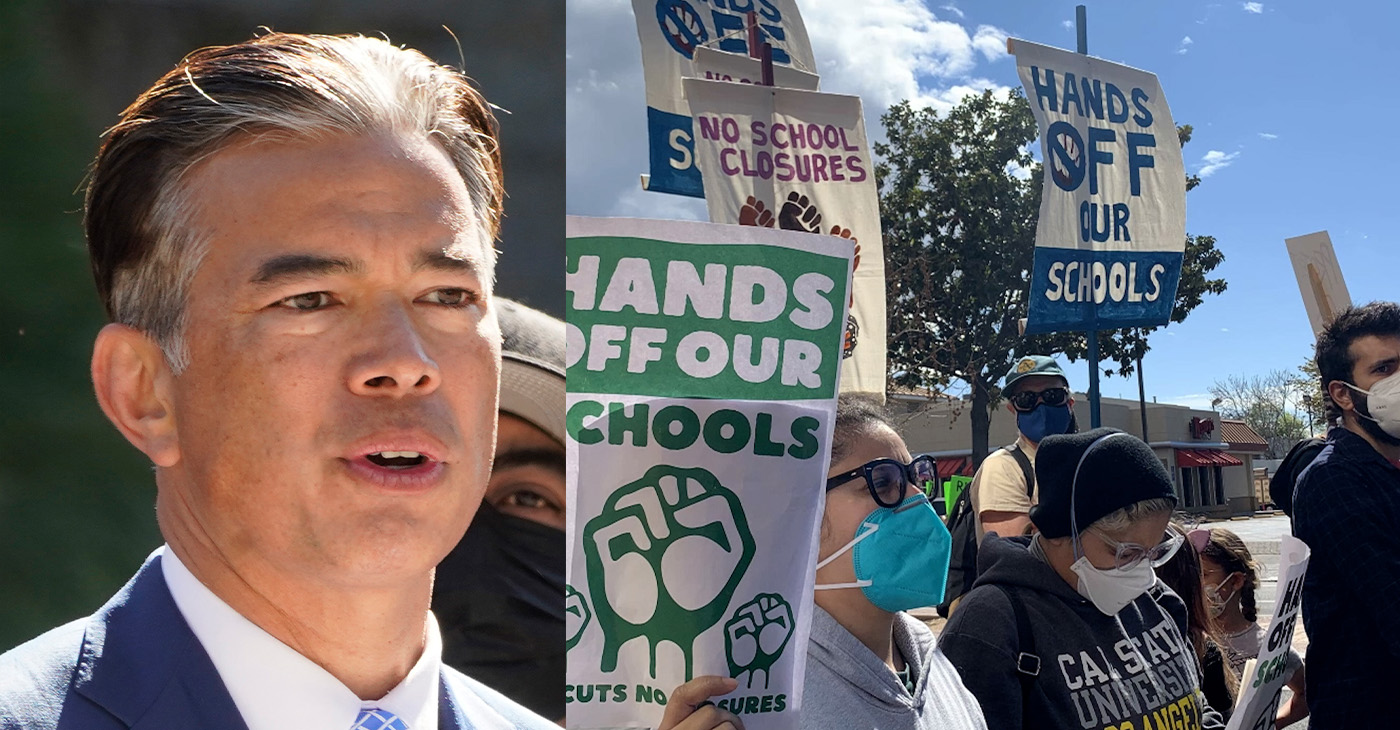
AG Bonta said DOJ investigation of 2022 closure decisions would have negatively impacted Black and low-income families.
By Post Staff
California Attorney General Rob Bonta sent a letter this week to the Oakland Unified School District (OUSD) Board of Education saying the district has a duty to comply with state education and civil rights laws to protect students and families from “disparate harm,” such as segregation and discrimination, if the district goes ahead with school closures, mergers or consolidations in 2025-2026.
The letter and an accompanying media release announced the findings of the California Department of Justice’s (DOJ) investigation into the OUSD Board’s Feb. 8, 2022, decision to close Parker Elementary, Brookfield Elementary, Carl B. Munck Elementary, Fred T. Korematsu Discovery Academy, Grass Valley Elementary, Horace Mann Elementary, and Community Day School and eliminate grades 6-8 of Hillcrest Elementary and La Escuelita Elementary.
“All school districts and their leadership have a legal obligation to protect vulnerable children and their communities from disparate harm when making school closure decisions,” said Attorney General Bonta.
“The bottom line is that discrimination in any form will not be tolerated,” he said. “I am committed to working with OUSD’s leadership to achieve successful outcomes for students.
“My office will continue to monitor OUSD’s processes and decision-making as it moves forward with the required community engagement, equity impact analysis, and planning to implement any future closures, mergers, or consolidations” to ensure compliance with California’s Constitution, AB 1912, and anti-discrimination laws.
By press time, the school district did not respond to a request for comment from OUSD.
The DOJ’s findings showed that the February 2022 decision, later partially rescinded, would have disproportionately impacted Black and low-income elementary students, as well as high-need students with disabilities, according to the media release.
The Attorney General outlined concerns about criteria OUSD has announced that it may rely on to determine future closures, mergers, and consolidations and provided recommendations to ensure OUSD does not violate state law, including prohibitions against closure decisions that reinforce school segregation or disproportionately impact any student group as required by the State Constitution, AB 1912, and anti-discrimination laws.
According to AB 1912, passed in September 2022, financially distressed school districts contemplating school closures, mergers, or consolidations must engage the community before closing schools; conduct an equity impact assessment; and provide the public with the set of criteria the district plans to utilize to make decisions.
In the letter, DOJ identified a “problematic” approach to planning for closing schools in 2025-2026 and “strongly recommends” steps OUSD should take going forward.
- “Take affirmative steps to ensure that its enrollment and attendance boundary and school closure decisions alleviate school segregation and do not create disproportionate transportation burdens for protected subgroups.”
- Don’t solely utilize criteria such as school facilities’ conditions, school operating costs, and school capacity without also including an assessment of past and present inequities in resources “due to educational segregation or other causes.”
- Some of OUSD’s proposed guidelines “may improperly penalize schools serving students with disabilities and students who have high needs.”
- The district’s decisions should also include “environmental factors, student demographics and feeder attendance patterns, transportation needs, and special programs.”
- Avoid overreliance on test scores and other quantitative data without also looking at “how each school is serving the needs of its specific student body, especially as it relates to historically marginalized communities.”
- “Engage an independent expert to facilitate community input and equity impact.”
The letter also emphasized that DOJ is willing to provide “feedback and consultation at any time during the process to ensure that OUSD’s process and outcomes are legally compliant and serve the best interests of the school community and all of its students.”
Community
Attorney General Rob Bonta, Oakland Lawmakers, Introduce Legislation to Protect Youth Online
At a press conference in downtown Oakland on Jan. 29, Attorney General Rob Bonta joined Sen. Nancy Skinner (D-Berkeley) and Assemblymember Buffy Wicks (D-Oakland) to announce two pieces of legislation designed to protect children online. The bills are Senate Bill (SB) 976, the Protecting Youth from Social Media Addiction Act and Assembly Bill (AB) 1949, the California Children’s Data Privacy Act.
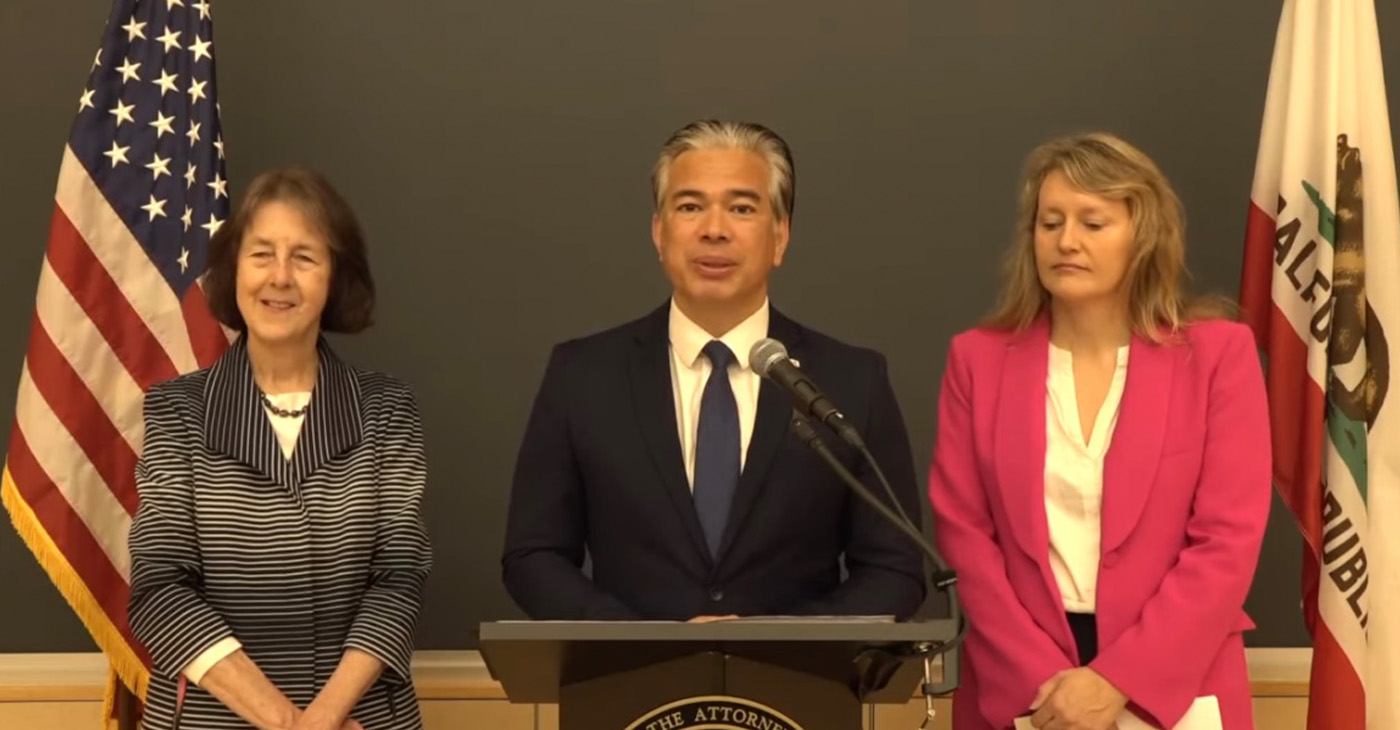
By Magaly Muñoz
At a press conference in downtown Oakland on Jan. 29, Attorney General Rob Bonta joined Sen. Nancy Skinner (D-Berkeley) and Assemblymember Buffy Wicks (D-Oakland) to announce two pieces of legislation designed to protect children online.
The bills are Senate Bill (SB) 976, the Protecting Youth from Social Media Addiction Act and Assembly Bill (AB) 1949, the California Children’s Data Privacy Act.
Skinner authored SB 976, which addresses online addiction affecting teenage users, while Wicks’s bill, AB 1949, takes on big tech by proposing data privacy and children rights protections.
“Social media companies unfortunately show us time and time again that they are all too willing to ignore the detriment to our children, the pain to our children, the mental health and physical challenges they face, in order to pursue profits,” Bonta said.
SB 976 would allow parents to control the nature and frequency of the content their under-18-year-old children see on social media. Notifications from social media platforms would also be paused from midnight to 6 am and controls would allow parents to set time limits on their children’s usage based on their discretion.
Skinner stated that the longer that kids are on their phones during the day, the higher the risk for depression, anxiety and other related issues.
The bill would also push to get rid of addictive media that is harmful for young women and girls, specifically image filters that mimic cosmetic plastic surgery.
Bonta and 33 other attorney generals had previously filed a lawsuit against Meta, owner of the popular social media applications Instagram and Facebook. The filing claims that the company purposefully uses algorithmized content that harms younger audiences.
“Social media companies have the ability to protect our kids, they could act, but they do not,” Skinner said.
The Child Data Privacy Act would strengthen existing protections for data privacy under the California Consumer Privacy Act (CCPA). The lawmakers argue that the law does not have effective protection for those under 18 years old.
Wicks stated that the bill would forbid businesses from collecting, using, sharing, or selling personal data of anyone underage unless they receive informed consent, or it becomes necessary for the purpose of the business.
Wicks added that the acts would make it so that a search on the internet like “How do I lose weight?” would not result in dieting pill advertisements targeting youth, which, some experts report, could be harmful to their mental and physical health.
“In a digital age where the vulnerabilities of young users are continually exploited, we cannot afford to let our laws lag behind, our children deserve complete assurance that their online experience will be safeguarded from invasive practices,” Wicks said.
Supporters of the two acts say they have gained bipartisan support issue, but the authors and Bonta expect them to be met with pushback from the affected companies.
Business
V.P. Kamala Harris: Americans With Criminal Records Will Soon Be Eligible for SBA Loans
Speaking in Las Vegas on Jan. 27, Vice President Kamala Harris announced a forthcoming federal rule that will extend access to Small Business Administration (SBA) loans to Americans who have been convicted of felonies but have served their time. Small business owners typically apply for the SBA loans to start or sustain their businesses.
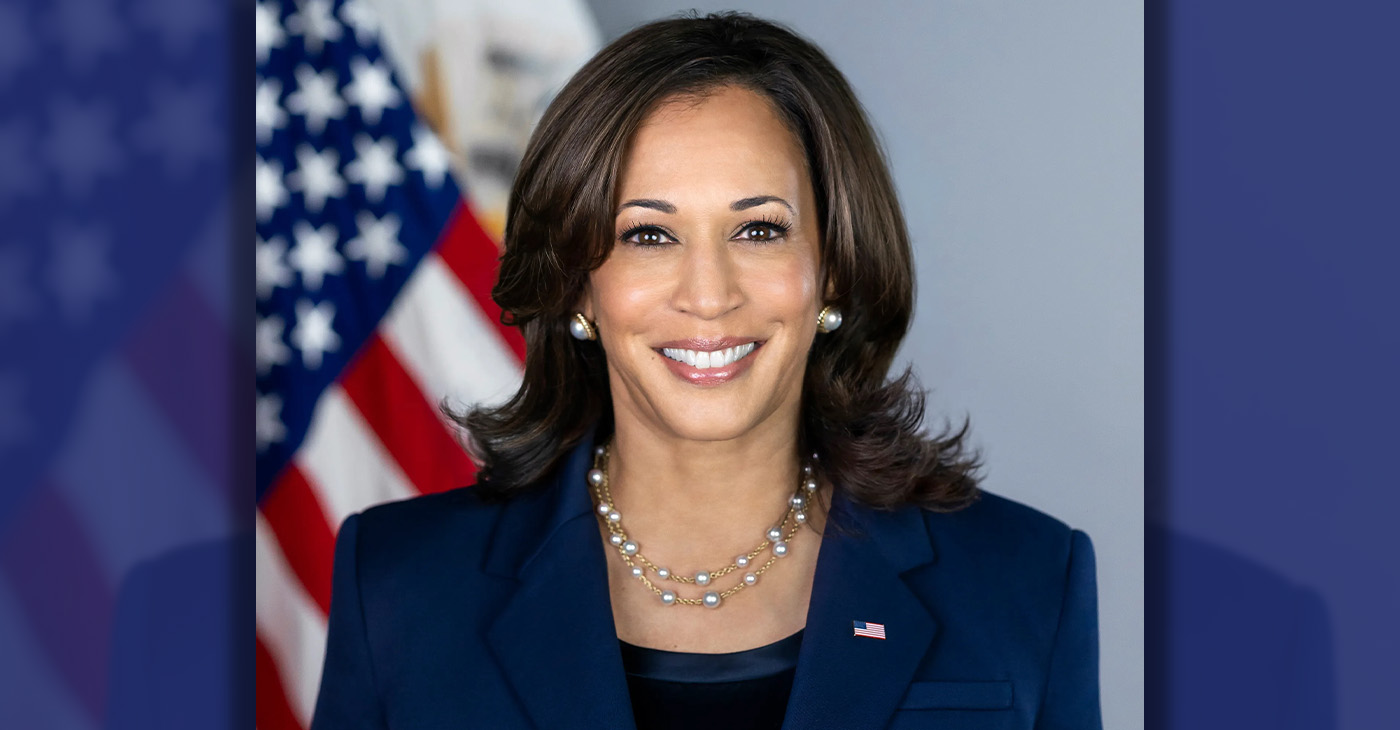
By California Black Media
Speaking in Las Vegas on Jan. 27, Vice President Kamala Harris announced a forthcoming federal rule that will extend access to Small Business Administration (SBA) loans to Americans who have been convicted of felonies but have served their time.
Small business owners typically apply for the SBA loans to start or sustain their businesses.
Harris thanked U.S. Rep. Steven Horsford (D-NV-04), the chair of the Congressional Black Caucus, for the work he has done in Washington to support small businesses and to invest in people.
“He and I spent some time this afternoon with business leaders and small business leaders here in Nevada. The work you have been doing to invest in community and to invest in the ambition and natural capacity of communities has been exceptional,” Harris said, speaking to a crowd of a few hundred people at the Brotherhood of Electrical Workers Hall in East Las Vegas.
On her daylong trip, Harris was joined by Horford, SBA Administrator Isabella Guzman, Interim Under Secretary of Commerce for Minority Business Development Agency (MBDA) Eric Morrissette, and Sen. Catherine Cortez Masto (D-Nev).
“Formerly incarcerated individuals face significant barriers to economic opportunity once they leave prison and return to the community, with an unemployment rate among the population of more than 27%,” the White House press release continued. “Today’s announcement builds on the Vice President’s work to increase access to capital. Research finds that entrepreneurship can reduce recidivism for unemployed formerly incarcerated individuals by as much as 30%.”
-

 Activism4 weeks ago
Activism4 weeks agoOakland Post: Week of March 20 – 26, 2024
-

 #NNPA BlackPress3 weeks ago
#NNPA BlackPress3 weeks agoMayor, City Council President React to May 31 Closing of Birmingham-Southern College
-

 #NNPA BlackPress3 weeks ago
#NNPA BlackPress3 weeks agoCOMMENTARY: D.C. Crime Bill Fails to Address Root Causes of Violence and Incarceration
-

 #NNPA BlackPress3 weeks ago
#NNPA BlackPress3 weeks agoFrom Raids to Revelations: The Dark Turn in Sean ‘Diddy’ Combs’ Saga
-

 #NNPA BlackPress3 weeks ago
#NNPA BlackPress3 weeks agoCOMMENTARY: Lady Day and The Lights!
-

 #NNPA BlackPress3 weeks ago
#NNPA BlackPress3 weeks agoBaltimore Key Bridge Catastrophe: A City’s Heartbreak and a Nation’s Alarm
-

 #NNPA BlackPress3 weeks ago
#NNPA BlackPress3 weeks agoBaltimore’s Key Bridge Struck by Ship, Collapses into Water
-

 Activism3 weeks ago
Activism3 weeks agoOakland Post: Week of March 27 – April 2, 2024

